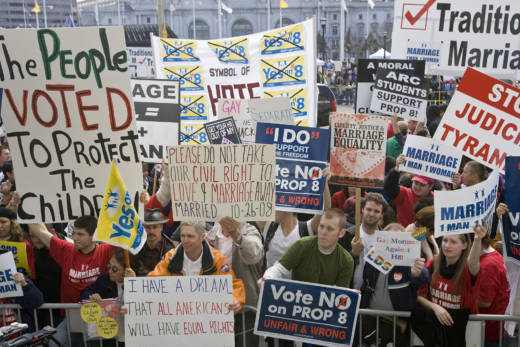Although the entire 2010 trial was scheduled to be broadcast live, the U.S. Supreme Court intervened, ruling that the trial court did not follow proper procedures before allowing the live video streaming.
The entire trial and closing arguments were videotaped anyway, but objections from opponents of same-sex marriage and a federal court order have kept the recordings from being released.
"The sealing of the videotape of the Prop. 8 trial can no longer be justified by any compelling interest," KQED attorney Thomas Burke wrote in the court filing. KQED argues that the value of unsealing the tapes "now far outweighs the privacy or other interests of judicial administration."
As the trial proceeded, attorneys representing Proposition 8 (the California attorney general declined to defend the measure as it ordinarily would) argued against broadcasting the trial for fear it could invade the privacy or even threaten the safety of their witnesses.
In its brief, KQED argues that seven years after Judge Vaughn Walker issued his ruling in the case, "any meaningful threat of public broadcast has now fully dissipated."
KQED's case is being supported by the original plaintiffs, the City and County of San Francisco, the American Civil Liberties Union and others.
In opposition to unsealing the recordings, Proposition 8 proponents' attorney Charles Cooper quotes the 9th U.S. Circuit Court of Appeals, which in 2012 rejected an earlier request by a coalition of media, including KQED, to release them.
“The trial judge on several occasions unequivocally promised that the recording of the trial would be used only in chambers and not publicly broadcast," Judge Stephen Reinhardt wrote. "He made these commitments because the Supreme Court had intervened in this very case in a manner that required him to do so."
Cooper also argues that because Walker’s assurances that the recordings were only for his private use "were unequivocal, the harm to judicial integrity that would result from revoking them is no less severe today than it was when the Ninth Circuit ruled five years ago."
Representing Proposition 8 proponents on Wednesday, attorney Pete Patterson added little to their written arguments. He didn't really have to, given Judge Orrick's opening comments.
Orrick said he did not believe Judge Reinhardt intended to keep the trial recordings permanently sealed, suggesting a motion to unseal them could be reconsidered in 2021, 10 years after the Proposition 8 trial decision went up to the 9th U.S. Circuit Court of Appeals.
Despite the passage of time, and the legal resolution of the same-sex marriage issue by the U.S. Supreme Court in 2013, Proposition 8 proponents argue that releasing the videotapes would "increase the risk of harm to proponents and witnesses" from LGBT rights supporters.
They also argue that ignoring the earlier promise to keep the recordings sealed "would cause tangible harm to our system of justice. Witness cooperation would be more difficult to obtain if the public were unable to trust promises about the broadcast of trial proceedings."
About a dozen LGBT advocates showed up for the hearing to support unsealing the recordings. One of them was Ryan Kendall, who testified during the trial about the damage done to him by so-called reparative therapy that falsely claims to "convert" sexual orientation from gay to straight.
"When I walked into that courtroom seven years ago, it was with a full expectation that it would eventually be broadcast," Kendall said after the hearing on Wednesday. "Clearly I think this is a matter of great public importance and that it would only benefit individuals and families and protect children by letting people see my testimony in particular and the testimony of this case in general."
Kendall said he hopes the court will consider releasing parts of the trial testimony, while maintaining a seal on testimony from witnesses who testified in support of California's same-sex marriage ban, if that's what those witnesses want.
"We need to change everyone’s hearts and minds so that people are no longer targeted for being gay, tortured for being gay, murdered for being trans or gay," he said. "These things happen in the real world, and we’re not fighting for tapes, we’re fighting for lives."
"I have nothing to fear from the truth," Kendall added.
Support for same-sex marriage throughout the U.S. has grown dramatically in recent years, according to the results of a Pew Research Center survey published this week.
Scott Shafer filed a declaration in support of KQED's motion.

